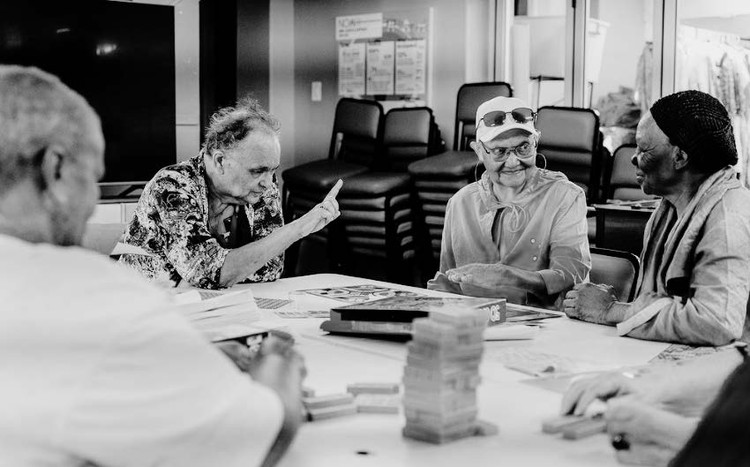
3 October 2023
Neighbourhood Old Age Home (NOAH) provides services for older people in Cape Town. Photo: Noortjie van Wulfen, supplied by NOAH.
South Africa’s population is ageing, yet government funding for community-based elder care services is not increasing to meet the demand.
This is a key finding by Family Caregiving, a programme at the University of Cape Town focused on the needs of older people, which has released two reports on funding for old age care and how care is experienced by older people in South Africa.
“We want to work with the government and make useful suggestions about what is needed,” says Dr Elena Moore, who led the research together with Dr Gabrielle Kelly.
There are nearly 6-million people over the age of 60 in South Africa, about 10% of the population. The older population is expected to grow to over 15% of the total population by 2050. Also, 40% of older people have a significant need for care, says Moore.
The government currently provides subsidies to non-profit organisations that provide health and social services for older people. But according to Family Caregiving’s research, the overall amount spent on these subsidies by provincial governments, when adjusted for inflation and the growing ageing population, has decreased by 13% since 2007.
A lack of sufficient care for older people means that family members, often women, carry the burden of caring for older family members. The government does provide a Grant-in-Aid social grant of R510 a month, but few people who qualify for it know about it and the amount is too little to cover the cost of a full-time carer, according to the Family Caregiving report.
Family Caregiving is calling on the departments of social development and health to expand the implementation of the Older Persons Act of 2006. The Act provides for community-based care services, ensuring that older people can stay within their households and access the care they need in their communities.
According to the report, approximately 80,000 older people in South Africa receive care at a community centre and about 18,000 people receive state subsidies in care homes. But the report found that the subsidies do not come close to covering the running costs of these programmes and that existing programmes do not meet the growing demand.
Neighbourhood Old Age Home (NOAH), a non-profit organisation in the Western Cape, provides a variety of services. Its housing programme provides 94 beds. For this, it receives R440,000 from the provincial department for social development. But the actual cost of running the programme is nearly R850,000, so the organisation has to absorb almost half the running costs.
In Khayelitsha, NOAH runs a service centre that provides community-based care and support services to nearly 90 older people. The centre operates five days a week and offers meals, educational and skills development programmes, health and social services, and recreational opportunities.
The centre qualifies for an R2,230 subsidy per person per year. It receives R190,000 from the government, but it costs R540,000 to run.
In Woodstock, the NOAH service centre has 29 beneficiaries. It operates three days a week and qualifies for a subsidy of R1,419 per person per year. It received R59,300 in government funding, but it costs over R600,000 to run.
In KwaZulu-Natal, non-profit organisation The Association For The Aged (TAFTA) runs a variety of services for older persons. Its frail care services rely on a subsidy as well as the beneficiaries’ monthly old age grants, but this makes up only 40% of its running costs, creating a monthly shortfall of R6,600 per person.
TAFTA’s assisted living programme is not subsidised. Beneficiaries contribute their old age grant (R2,080) towards food and accommodation and TAFTA contributes another R2,500 per person. TAFTA service centres receive R18 per person per day, leaving a shortfall of R35 per person per day.
According to Family Caregiving, smaller organisations that do not have the institutional networks of NOAH and TAFTA are often not able to absorb these shortfalls.
Esther Lewis, spokesperson for the Western Cape Department of Social Development, says the province subsidises 186 service centres, catering for 12,000 people. The province also supports financially struggling organisations with mentoring and training. This year, the Western Cape department provided additional grants to organisations for operational costs.
Although funding has increased in the Western Cape and KwaZulu-Natal since 2007, in most provinces subsidies are not paid or are not reported, Family Caregiving found.
Family Caregiving is calling for more funding for old-age care, from subsidies for care organisations to increased funding for health facilities for old age care.
Moore says a multi-disciplinary team is needed to address the challenges facing older people. The team should include representatives from the government departments and organisations as well as a range of experts, from economists to healthcare practitioners.
The Family Caregiving report recommends that the government take steps to ensure that all provinces provide subsidies for old age care and that subsidies increase to meet the growing demand. It recommends that while subsidies focus on service centres and residential care, government support for home-based care services be expanded. Also, existing healthcare facilities, such as clinics and hospitals, can be better optimised to care for older people. Health workers should receive training and information on caring for older people, the report says.